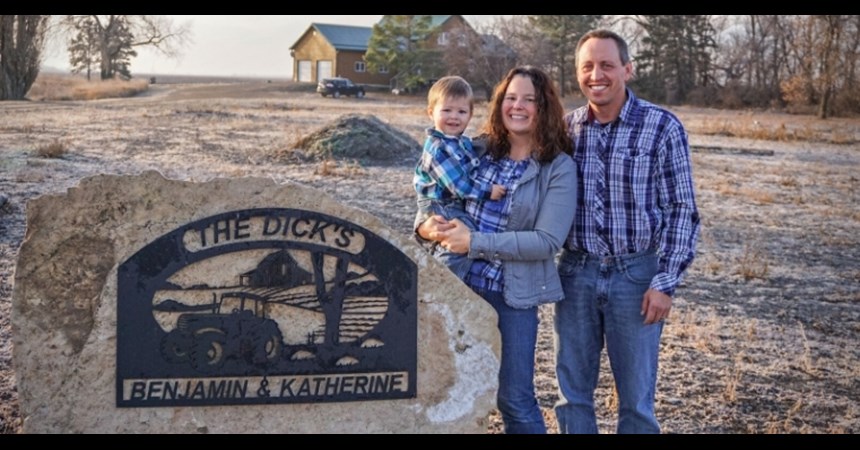Benji Dick, a 48-year-old North Dakota farmer, uses his head, as well as his heart, to make decisions about giving. He takes advantage of an often-overlooked giving tool for farmers--gifting farm commodities, including grain and legumes, directly to charity.
Giving crops directly to Dakota Boys and Girls Ranch, rather than selling the crop and giving the Ranch the proceeds, means he isn't taxed on that income at all. The result is a 100% deduction.
"Until we sell that crop and get a check for it, we're not taxed on the income," Benji said. "The first dollar up to the last dollar you give in grain or beans is tax-exempt."
The critical step in making this work is to literally donate the crop to the charity.
For example, in 2018, Benji donated kidney beans. Other years he has donated corn and soybeans. After delivering the beans, Benji called the elevator and designated a certain number of bushels to the Ranch.
A Ranch representative, in this case Linda Medhus, the Senior Development Officer who works with Benji and his wife, Katherine (Kat), called the elevator to direct the sale of the beans.
Benji keeps track of what he transfers to the Ranch and how much it was worth, but he doesn't have to report it as income or complete any special IRS form; and he can still deduct the production expenses. In turn, Medhus credits Benji for the gift, but she doesn't send him a receipt because the Ranch owned the commodity at the time of the sale.
It's a brilliant way to make a difference!
Benji and Kat have definitely made a difference in the ten years they have been giving to the Ranch. Because his parents gave to the Ranch, Benji feels as if he's always known about the ministry. It wasn't until he and Kat got "older and wiser," that they became aware of the challenges faced by troubled children and how much it takes to help them overcome tough situations.
"Mental health issues have become so much more prominent. It just seems like the problem is getting bigger all the time. The Ranch has a chance to reach kids at such a critical time and save their lives," Benji said. "Every kid 'saved' will touch others' lives going forward. You can't even measure the impact of kids getting their life straightened out and become happy, healthy adults. It will pay dividends down the road in the many lives they touch in a positive way."
As Christians, Benji and Kat give because it's the right thing to do. "One of the major tenets of Christianity is to help people. And there is a lot of need out there," Benji said.
"We don't have the wherewithal or the training to help those kids. And now that we have a child, and another on the way, we don't have a lot of time. But we do have the ability to give money. And when you give to the Ranch, you know it is directly helping the kids."
If Benji had the chance to sit down with a Ranch child, what would he say?
"That I can't even understand how tough your life has been, but I can tell you a lot of people care about you. People you have never met, people like Kat and I, care about you and pray for you. Accept the help. It really can change your life."
Smart Giving Through Gifts of Commodities
Farmers who can use cash basis accounting* can benefit from significant tax savings by donating farm commodities, including grains, legumes, and livestock, directly to their favorite charity. (For ease of reading, let's use "grain" as an example.)
Giving the grain to charity, rather than the proceeds from the sale of grain, allows farmers to exclude the sale from their taxable income, which can result in a triple tax savings. The tax savings can include federal income tax savings, state income tax savings, and self-employment tax savings. In addition, most farmers are still able to deduct their production expenses.
1. The farmer puts the grain into the name of the charity when it is delivered to the elevator and asks the elevator to issues a warehouse receipt in the name of the charity. For grain stored on the farm, the farmer delivers a notarized letter of transfer to the charity.
2. The charity must direct the sale, and the original sales invoice must list the charity as the seller.
3. After the transfer, the charity assumes the full costs of storage, transportation, and marketing, and bears the risk of any loss.
If you are interested in gifting a portion of your harvest to Dakota Boys and Girls Ranch, please contact us. We can help you determine the best way to give that will benefit you and Ranch kids the most. We will also encourage you to consult with your professional tax and/or legal advisers to determine the tax implications specific to your situation.
*Crop share landlords are ineligible. A crop share landlord's portion of the crop is considered rental income, which must be reported on their tax return.
This article was originally published in Ranch Voice: Winter 2018.
Read more articles like this and explore other issues of Ranch Voice here.

